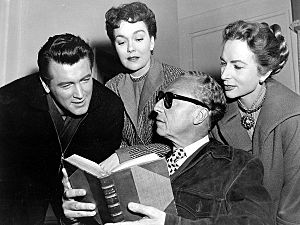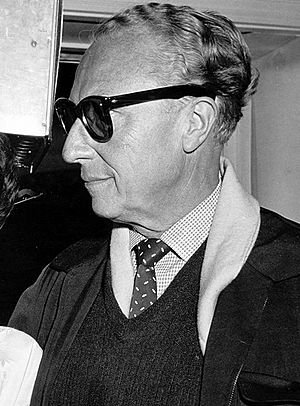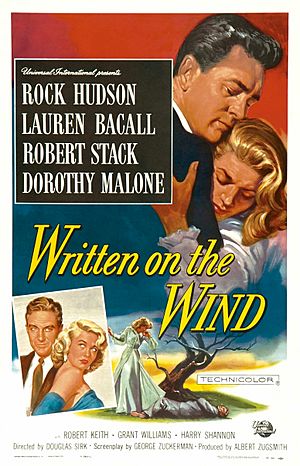Douglas Sirk facts for kids
Douglas Sirk (born Hans Detlef Sierck; April 26, 1897 – January 14, 1987) was a famous German film director. He is best known for his work in Hollywood during the 1950s. He directed many popular films called melodramas. Sirk began his career in Germany as a director for both the stage and movies. He moved to Hollywood in 1937 because his wife, who was Jewish, faced difficulties during the Nazi era.
In the 1950s, he made some of his most successful films. These include Magnificent Obsession, All That Heaven Allows, Written on the Wind, A Time to Love and a Time to Die, and Imitation of Life. At first, some critics thought these films were too emotional. However, today, many film directors, critics, and experts see them as masterpieces. Sirk's movies are now seen as a way to look closely at society in the 1950s. They also show a kind and understanding picture of characters who are stuck because of social rules. Sirk used detailed scenes and bright colors in his films to make his points clear.
Contents
Life and Work
Early Life in Germany
Douglas Sirk was born Hans Detlef Sierck on April 26, 1897, in Hamburg, Germany. His parents were Danish. He lived in Denmark for a few years as a child. Later, his family moved back to Germany and became citizens. When he was a teenager, Sirk discovered the theatre. He especially loved William Shakespeare's plays. He also started going to the cinema, where he saw emotional dramas. One of his favorite early movie stars was the Danish actress Asta Nielsen.
In 1919, Sirk began studying law at Munich University. However, he left Munich after a political uprising. He then started writing for his father's newspaper. Sirk continued his studies at the University of Jena and then at Hamburg University. There, he changed his focus to philosophy and art history. He even attended a lecture by the famous scientist Albert Einstein. A big influence on him was art historian Erwin Panofsky. Sirk learned a lot from Panofsky.
To support himself, Sirk worked at the Deutsches Schauspielhaus theatre in Hamburg. In 1922, he got his first chance to direct a play. The play, Bahnmeister Tod ("Stationmaster Death"), was a surprise success. After that, Sirk said he was "lost to the theatre." Besides theatre, Sirk also painted and worked as a set designer for a film studio. He even translated some of Shakespeare's works into German.
Sirk later became the first director at a theatre in Chemnitz. This job was very challenging. The theatre faced financial problems, and the actors had to work together to keep it open. They started performing comedies and melodramas because these plays made money. Sirk remembered this as a "pretty terrible time." But it was here that he learned how to direct and work with actors, even in difficult situations. This was during a time of very high inflation in Germany. Money would lose its value quickly, sometimes even within hours.
Sirk had a son, Klaus Detlef Sierck (1925–1944), with his first wife, Lydia Brincken. After Sirk remarried a Jewish woman, his ex-wife, who had joined the Nazi party, prevented him from seeing their son. Klaus became a well-known child actor in Nazi Germany. Sadly, he passed away as a soldier in 1944.
By the 1930s, Sirk was one of Germany's top stage directors. He joined UFA studios in 1934. There, he directed his first feature film, April, April (1935). His emotional films Zu neuen Ufern and La Habanera helped make Swedish singer Zarah Leander a star in German cinema.
Career in the United States

Sirk left Germany in 1937. He did this because of his political views and because his second wife, Hilde Jary, was Jewish. Before going to the United States, he worked on films in Switzerland and the Netherlands. When he arrived in the U.S., he changed his German birth name to Douglas Sirk. By 1942, he was working for Columbia Pictures. He directed the anti-Nazi film Hitler's Madman and Summer Storm (1944).
After World War II ended, Sirk briefly went back to Germany. But he soon returned to the U.S. He became very famous for directing a series of beautiful, colorful melodramas for Universal-International Pictures. These films were made from 1952 to 1959. They include Magnificent Obsession (1954), All That Heaven Allows (1955), Written on the Wind (1956), Battle Hymn (1957), The Tarnished Angels (1957), A Time to Love and a Time to Die (1958), and Imitation of Life (1959).
Even though Imitation of Life was a huge success in 1959, Sirk left the United States. He retired from filmmaking. He passed away in Lugano, Switzerland, almost 30 years later. He only briefly returned to directing in Germany in the 1970s. During that time, he taught at a film school in Munich.
Awards
- 1985 Bavarian Film Award, Honorary Award
Filmography
Feature Films
- April, April! (1935)
- 't Was één April (1936) (Dutch version of April, April)
- The Girl from the Marsh Croft (1935)
- Pillars of Society (1935)
- Schlußakkord (1936)
- The Court Concert (1936)
- La Chanson du souvenir (1936) co-director (French version of The Court Concert)
- To New Shores (1937)
- La Habanera (1937)
- Accord Final (1938) (uncredited)
- Boefje (1939)
- Hitler's Madman (1943)
- Summer Storm (1944)
- A Scandal in Paris (1946)
- Lured (1947)
- Sleep, My Love (1948)
- Shockproof (1949)
- Slightly French (1949)
- Mystery Submarine (1950)
- The First Legion (1951)
- Thunder on the Hill (1951)
- The Lady Pays Off (1951)
- Week-End with Father (1951)
- No Room for the Groom (1952)
- Has Anybody Seen My Gal? (1952)
- Meet Me at the Fair (1953)
- Take Me to Town (1953)
- All I Desire (1953)
- Taza, Son of Cochise (1954)
- Magnificent Obsession (1954)
- Sign of the Pagan (1954)
- Captain Lightfoot (1955)
- All That Heaven Allows (1955)
- There's Always Tomorrow (1956)
- Written on the Wind (1956)
- Battle Hymn (1957)
- Interlude (1957)
- The Tarnished Angels (1957)
- A Time to Love and a Time to Die (1958)
- Imitation of Life (1959)
Images for kids
See also
 In Spanish: Douglas Sirk para niños
In Spanish: Douglas Sirk para niños
 | Aurelia Browder |
 | Nannie Helen Burroughs |
 | Michelle Alexander |






